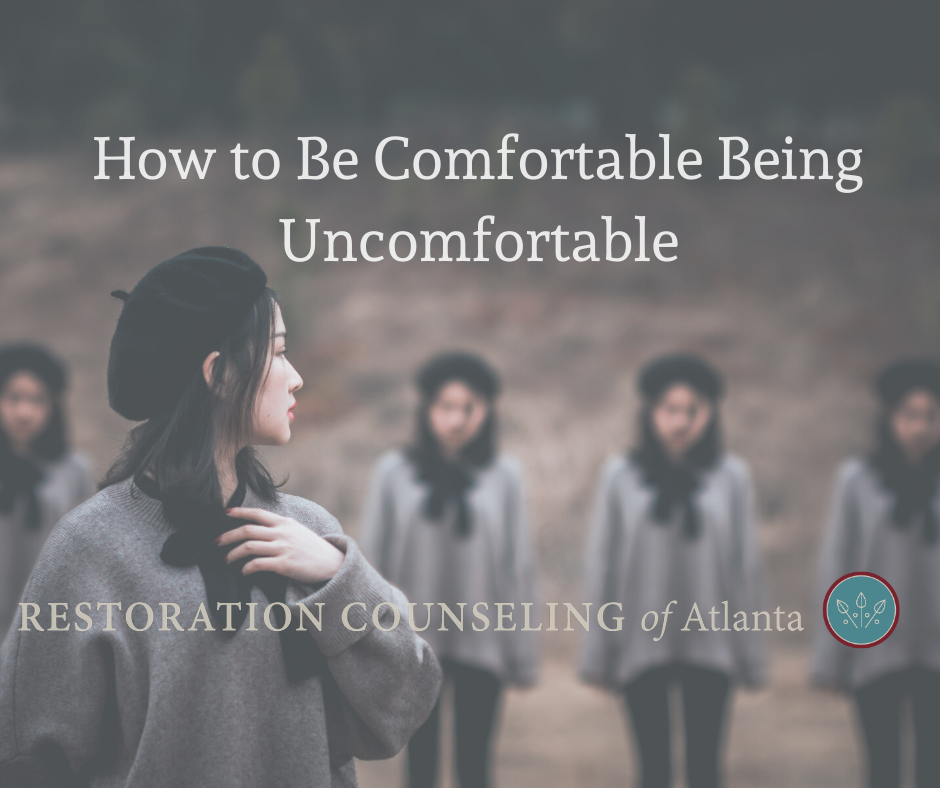“God is concerned with my character, not my comfort.”—Anonymous
The topic alone can be uncomfortable. Hopefully, in this article, you will learn how to gain insight into developing skills to be comfortable with being uncomfortable.
Comfort is “a state of physical ease and freedom from pain or constraint; or the easiness or alleviation of a person’s feelings of grief or distress”.[i] Discomfort is slight pain or a state of unease, worry, or embarrassment.[ii] The key words that create a difference in the two definitions are loss of comfort due to the presence of pain.
So what makes comfort comfortable?
Comfort is predictable and meets our expectations. In other words, if we do “A” then we will get “B”. For example, science says water will turn to ice when the temperature is 32° or colder, so our expectation is for that process to happen. But what if we put water in a freezer set at 20° and the water doesn’t turn into ice? Our expectations are not met, it is not predictable, and now it’s hard to trust that process. When things are predictable, we can trust the process because we know our expectations will be met.
Comfort gives us safety. When we can give more of our trust, we can feel safe and in control that we know how to meet our needs. When we are safe we can experience peace and harmony.
Comfort gives us a sense of ease and convenience. Once we trust the process more, we can do things quickly to meet our expectations quickly and conveniently when we want to. The “Amazon 1-click button” is a great example of this.
What makes discomfort discomforting?
It’s uncomfortable! It is a loss of comfort due to the presence of pain—it is unpredictable, it is uncertain. Pain is not convenient or easy. It is uncomfortable to experience painful emotions, situations, or relationships.
Discomfort disturbs peace and harmony. This creates an imbalance. Imbalance can make us uneasy and may create an inconvenience. It takes away control which can create a fear of the unknown because it is unpredictable, therefore leaving us vulnerable and at risk of pain.
It can be unsafe. We can feel that we are not in control. Vulnerability creates a risk of experiencing pain. Pain can create discomforting feelings of anxiety and frustration, as well as terror and rage as we attempt to protect ourselves.
What are risks of focusing too much on being comfortable?
If we try to control situations to maintain predictability and safety in our lives, we create a pattern of avoidance of pain and change. With resistance to change, we become comfortable with the predictable and intolerant or fearful of things that are different. We especially see this in politics and race.
Avoiding discomfort can encourage intolerance or stubbornness to change. Without change, we do not learn and grow and become stagnant or stuck. For example, if our bodies do not change, we will stay stuck at the same height as when we were children. Similarly, if we do not learn or grow in awareness of our emotions and mentality, we can become stuck emotionally and relationally. Being stuck or trying to fix people or situations that we do not have control over can lead to depression, anxiety, and addiction, as well as a lack of awareness in ourselves and why we do what we do.
Intolerance can lead to entitlement. Entitlement is “a belief in having rights to something they have done nothing to earn”[iii]. Beliefs that breed entitlement are “I deserve easy”, “I deserve it now”, “It should be done my way because I do everything right”, and “I am owed comfort”. During some days and seasons of life, we will experience great comfort and joy. At other times we will experience great discomfort and pain. The news, social media, and weather remind us that, ultimately, we are not God. We can control objects and their functioning, but when it comes to relationships and life in general, we are powerless.
So how do we become comfortable with being uncomfortable?
“The only thing worse than feeling pain is not feeling pain. Healthy people face their pain. When they are sad, they cry. When they are angry, they acknowledge they are angry. They don’t pretend to have only PG-rated feelings. They don’t judge their feelings. Rather, they simply observe and describe them.”[iv]
Start with what you can tolerate.
Like lifting weights, you need to start with a weight of discomfort you can handle. You gain strength as you continue to challenge yourself and take on more difficult situations, conversations, and emotions. In getting comfortable with being uncomfortable, we begin to have confidence and the mindset of “I’ve done it before, I can do it again” or “I can learn and grow through this”. The more confidence we begin to have in our self and our abilities to control ourselves, the more we become open, willing, and resilient, with perseverance, plus flexibility[v]). Remember…a a bodybuilder did not become as strong as they are in a day or even months, but they kept building.
Be open-minded.
If we are closed-minded to discomfort, we become resistant to change and can miss out on opportunities to learn about ourselves and others. When we are open-minded, we can begin to learn to invite, cope, and grow comfortable with being uncomfortable.
Get curious about discomfort.
“A healthy person is one who can grow and learn from all experiences.”[vi] Instead of avoiding discomfort, learn from it by asking yourself, “Why am I uncomfortable at this moment?” Discomfort can teach us far more about ourselves and how we handle difficult relationships and emotions. This doesn’t mean that we tolerate everything uncomfortable or that violates us and our boundaries. There is a difference between when someone is screaming at you and someone who is angry at you.
Practice the skill of acceptance.
The more we are open-minded and aware, the more we can practice the skill of acceptance. “When I stopped living in the problem and began living in the answer, the problem went away. . . . And acceptance is the answer to all my problems today. When I am disturbed, it is because I find some person, place, thing, or situation—some fact my life—unacceptable to me, and I can find no serenity until I accept that person, place, thing, or situation has been exactly the way it is supposed to be at this moment. Nothing, absolutely nothing happens in God’s world by mistake. Community [emphasis added] and acceptance have taught me that there is a bit of good in the worst of us in and a bit of bad in the best of us; that we are all children of God and we each have the right to be here. When I complain about me or you, I’m complaining about God’s handiwork. I’m saying that I know better than God.”[vii] Acceptance doesn’t mean we agree with everything we do or what happens. Acceptance acknowledges reality and our place in reality.
Determine what is in your control.
There is not a whole lot we can control in this life. The serenity prayer captures this reality excellently—“God, grant me the serenity to accept the things I cannot change, the courage to change the things I can, and the wisdom to know the difference.” And when it comes to relationships, the only thing we can control is ourselves.
Exercise courage through visualization.
When you visualize how you will move through discomfort, it builds more confidence and courage to embrace discomfort. Essentially visualization takes the edge off of discomfort to make it more tolerable because you’ve done it before in your head.
Find support.
When the pain becomes too unbearable, ask for help. Be honest with friends and family and find a support group or a therapist, you can feel safe with. Life is meant to be lived in community and joy,[viii] despite the discomfort. We were made to share life’s struggles of discomfort or the joy of security with others.

Written by: Micah Mabe, MA MFT, APC
micah@restorationcounselingatl.com, ext. 158
Micah comes from a Christian background and enjoys working with adolescents and families, as well as couples. His focus is coming alongside families, adolescents, and teenagers who desire to find help and resolution. His other focus is helping couples who want to understand and love their partner better to enhance their marriage. He also helps couples who are in conflictual relationships that are struggling with disconnection and isolation.
References
[i] Comfort: Definition of Comfort by Lexico. (n.d.). Retrieved from https://www.lexico.com/en/definition/comfort
[ii] Discomfort: Definition of Discomfort by Lexico. (n.d.). Retrieved from https://www.lexico.com/en/definition/comfort
[iii] Entitlement: Definition of Entitlement by Lexico. (n.d.). Retrieved from https://www.lexico.com/en/definition/entitlement
[iv] Pipher, M. B. (2016). Letters to a young therapist: stories of hope and healing. New York: Basic Books, a member of the Perseus Books Group.
[v] Resiliency and Sustainability: Eight Elements for Superintendents Who Want to Make a Difference and Have the Resolve to Do So. (2018, March 14). Retrieved from https://thesystemsthinker.com/resiliency-and-sustainability-eight-elements-for-superintendents-who-want-to-make-a-difference-and-have-the-resolve-to-do-so/
[vi] Pipher, M. B. (2016). Letters to a young therapist: stories of hope and healing. New York: Basic Books, a member of the Perseus Books Group.
[vii] BN Publishing. (2008). Alcoholics Anonymous big book. Charleston, SC.
[viii] [The Star Online]. (December 12, 2019). “Plan your joy,” suggests Michelle Obama [Video File]. Retrieved from https://www.youtube.com/watch?v=m2felyLKSo0

